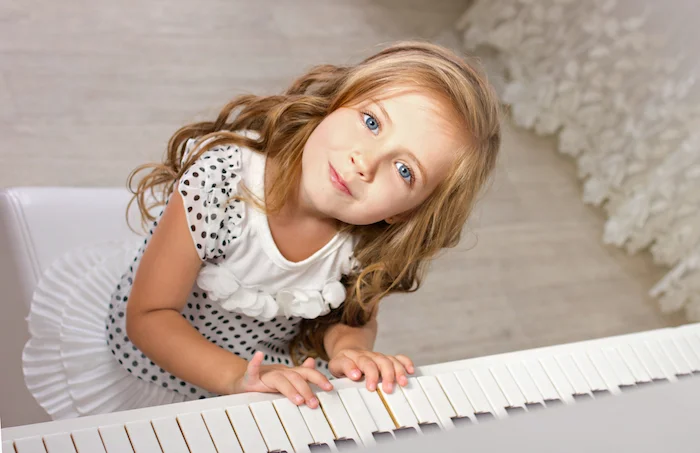With recital season fast approaching, some teachers may be wondering “What is the best way to get my student excited and prepared for the recital? What kind of arrangement should he/she perform? Is he or she even ready for recital?”
In this article we will discuss
How to determine if your student will benefit from recital participation.
How to get a student excited and prepared for performance.
Tips for boosting confidence
Options for performance arrangements.
The Musical benefits of performing in recitals!
“Is my student ready for recital?”
Another way to frame this question is: “Will this student benefit from recital participation?” It’s my experience that students who are: over the age of 4, have been learning for 4 months or more, and can perform a full musical expression (even a short one) will most likely benefit from recital participation.
A full musical expression can be a method book melody, an excerpt from a favorite pop song or holiday melody. Some young beginners perform 2-3 short melodies for their performance.
“Is memorization required for student performance?”
Memorization is not required for recital participation. For the student to get the most benefit from recital participation however, we do recommend that a recital piece be material that the student has worked on for multiple consecutive weeks.
For students who are able to adeptly perform their musical piece with the music in front of them, memorization is the ultimate step in music mastery, and the memorization process itself has many musical and cognitive benefits.
“What can I do if my student doesn’t seem interested?”
Students are often naturally inclined to shy away from public performance. And it’s no wonder - It’s scary performing in front of people! Rather than simply asking the student “Want to perform?” try introducing the recital this way to the parent:
“Westlake Lessons is hosting a student recital on this date, and I think this piece we are working on would make a great performance! If you’re all available at that date, I would love for ‘Johnny’ to participate. With our remaining lessons and with some good practice, he could be fully prepared for a great performance!”
That being said, some students and families may not be comfortable with participating and that is certainly okay. As teachers, though, I think we owe it to our students to encourage recital participation each season in a positive way, rather than assuming a student or family isn’t interested in participating.
“How can I help my student feel less nervous about performing”
It can be helpful to use these friendly reminders for students preparing for recital:
“You’ll be performing in front of a friendly audience!”
“Your parents and family are gonna be so impressed!”
“If you do make a mistake, its okay, that’s part of the learning process — it’s how you get better!”
“You know this music more than the audience, so even if you do make a mistake, just keep playing like nothing happened — most people wont even notice!”
“Will you be available to attend?”… Your students and parents will want to know!
If you are available for any time slots at the student recital, your attendance is incredibly appreciated.
If your availability is flexible and you have only a few students, you may want to coordinate with families on a time that works for both of you.
If you have several students, or limited availability, you may want to pick one or two time slots you will be able to attend, and communicate that with your students’ families and the Westlake Lessons office.
Student / Teacher Duets Vs. Student Solo Performances
Your participation gives you and the student options for teacher/student duet. A duet arrangement can make simple pieces sound musically fulfilling and impressive, and can give shy students feel more comfortable on stage.
If you cannot attend, or your student can’t attend the time slot your available for, it can be a good opportunity for your student to perform solo. Students are also free to use a backing track for accompaniment (for this we strongly recommend the student is very familiar playing to the backing track.)
No matter what kind of performance arrangement we want to do, it’s important to determine that early in the planning process, so the student is comfortable and confident when it is time to perform.
Lets Get ‘Recital Ready’!
As a teacher, recital season has always been my favorite time of year. It’s the time to take a step back from the theory concepts and say “let's use that theory to make this piece as good as we can!”
“Lets find the right notes,
…use the correct the fingers,
…tighten those rhythms,
…bring out the expression,
…bring up the tempo,
…memorize!
Whatever proficiency-level a student is at, recital season is when the pressure is on, and as teachers we can harness that pressure with positive guidance to take students to the next level!
Thank you for reading, and please write in the comments section below, methods and tips you use to get students excited and ready to perform!
-Patrick W.







